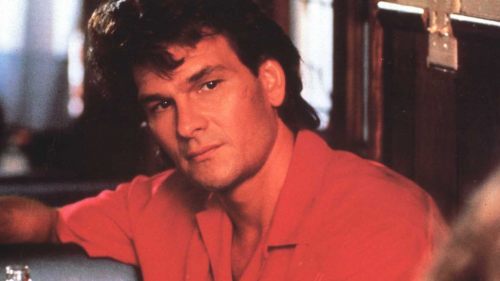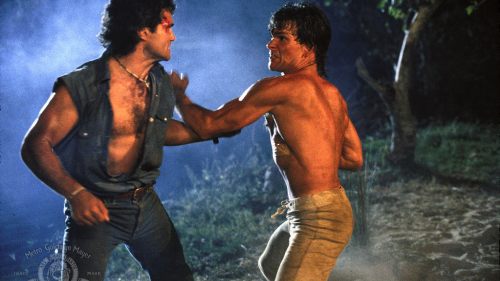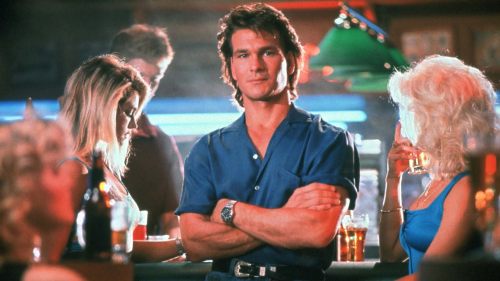So, Let’s Talk About ROAD HOUSE
Last week, legendary actor Ben Gazzara passed away at the age of 81. It was heartening to see the amount of post-mortem respect he received from musty journalists and young bloggers alike. There was a great deal of well-deserved focus on his early stage work, his unforgettable collaborations with John Cassavetes and his career-making performance in Preminger’s Anatomy of a Murder. He was a powerful, very human actor whose poise and distinct personality shone through in all of his work. That includes Road House, which Gazzara shamelessly acknowledged was probably his “most widely seen movie.”
In 1989’s man-sweat fairytale, the then-59-year-old actor was cast as a ruthless, unstoppable villain, fully capable of going toe-to-toe with any musclebound blow-dried meatchunk that dared sass him. Gazzara played the role with utter confidence, control and disarming affability despite being surrounded by monster trucks and half-shirts. In the film’s chaotic hurricane of looming steroid giants, the 5’10” senior citizen manages to be the most intimidating presence on screen, a feat that few actors – alive or dead – could ever hope to pull off.
Sadly, this incredible accomplishment earned him nothing but a 1990 Razzie Award nomination, along with four additional nominations for Worst Picture, Worst Director, Worst Screenplay and even Worst Actor for co-star Patrick Swayze. Reviews savaged the film from top to bottom, taking below-the-belt shots at everything from the extras’ hairdos to director Rowdy Herrington’s name. While the box office returns were acceptable, Road House drifted easily away into late ‘80s action movie haze.
But it didn’t stay there long. Much like another Gazzara-infused Hollywood clunker (The Big Lebowski), the film festered in the collective subconscious for years and eventually re-emerged as a blue collar favorite. Why? It’s a movie without a single pretension. There are no twists, no unnecessary manipulations, no bullshit. Good vs. bad. Black and white. Ayn Rand would have to admit that it’s a perfect representation of her philosophical concept of objectivism. And beyond all that (and I say this without a drop of irony), it’s an actual, bona fide MASTERPIECE.
Fine, Road House is obviously not in the same pantheon as a Sunset Blvd. or Mr. Smith Goes to Washington. It has no desire to be. Does that make it any less valid as entertainment? The Bicycle Thieves fulfills the viewer at intellectual and artistic levels, but Road House appeals to the reeking, unshaven American in us, and a cheeseburger is usually a lot more satisfying than a plate of foie gras. Just as importantly, the movie’s a time capsule that showcases a too often under-represented faction of society: the hard-working lower and middle classes of the rural US. Where most Hollywood movies take place in coastal and urban environments, Road House endeavors to speak for the nation’s other 94%.
The plot’s easy: A seemingly omniscient bouncer named Dalton (Swayze) is hired to clean up rugged Missouri bar The Double Deuce. He effectively eliminates the negative elements in house, but this sets off a full-scale war with local criminal kingpin Brad Wesley (Gazzara) that leaves the entire town trembling in a hail of beatings, explosions and – eventually – homicide.
Like many of the greatest movies, Road House rises to become infinitely more than the sum of its parts. It succeeds at its incredibly delicate balance of grassroots humor and increasingly severe, throat-ripping violence. It gathers an unbelievable ensemble of Coors-appeal actors (from X bassist John Doe to the great Sam Elliott) and lets them joyously beat the living shit out of each other. It slings unspeakable dialogue with maximum impact (“I used to fuck guys like you in prison!”). It serves up a white trash zen protagonist with visibly waxed butt cheeks…and lets you genuinely care about him. And he’s not alone; the film’s fictionally replicated Jasper, Missouri is teeming with the most colorful, rounded characters you could hope to meet, including some of the most overwhelmingly likable old men in cinematic history. SPOILER: this crew ultimately takes center stage in my favorite scene, an unanticipated eruption of masterfully barbaric, empowering grandpa-on-grandpa vengeance.
Ironically, critics widely dismissed the film as laughably unrealistic without realizing that it’s largely based on actual events. Norman “Storm” Cantwell was a former “cooler” who skinned his knuckles on night club patrons for years before taking on the job/town that would make his name legend. By the time Road House reached screens, Cantwell has graduated to a career in professional defense training, incorporating tai chi and Eastern philosophy into his courses.
While Cantwell himself is one of the movie’s many defenders, it’s still a long way from getting the credit it deserves. Small-minded viewers scoff at its dated aesthetics, but even a movie like Citizen Kane reflects the era in which it was filmed. Road House is regularly listed as one of The Most Enjoyably Bad Movies of All Time, but if a movie is entertaining, involving, well paced and acted, and ultimately gives you a satisfying viewing experience, then how is it “bad”? Irony is the social crutch of idiots; I look forward to the day when people can freely admit when something like Stone Cold or Invasion USA is just plain good. Or, in the case of Road House, PERFECT.
Long live the legacies of fallen Double Deuce soldiers Ben Gazzara, Patrick Swayze and Jeff Healey. Long live Road House.



